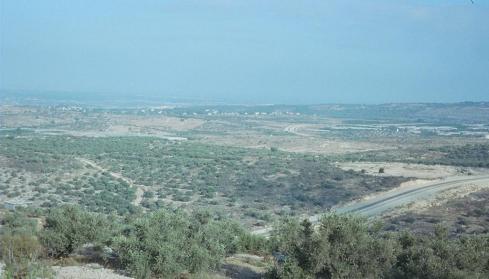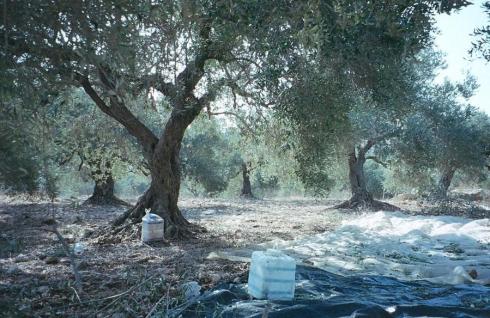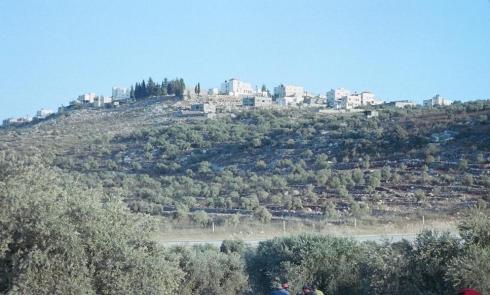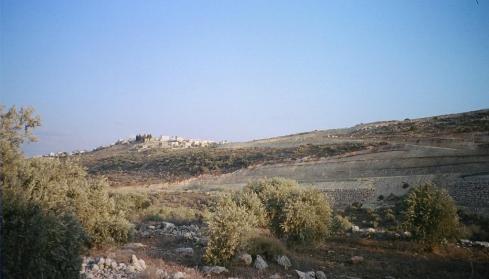As promised, in honor of the fall olive harvest, I’m posting an excerpt from Chapter 2, when I harvested olives for the first time in October 2003.
Before you read, you might want to take a look at the book’s website to see what the book is about and how this section fits into the general scheme. You might also want to see my previous post, which offers maps, pictures, and comics that serve as a geographic primer on the situation in the occupied Palestinian territories.
In Chapter One I graduated from college, bartended and traveled for a while, and landed rather randomly in a village in the West Bank called Jayyous in the company of two men, a British Muslim named Yusif and a Canadian paramedic named Sebastian. During my first night in Jayyous, I was nervous to be in a place where I had no idea what was going on, but my fears were quickly dispelled by the kindness, hospitality, and sense of humor of the people I met. I was invited to stay the night with the mayor’s son’s family, and the next morning I joined them for the olive harvest.
NOTE: You can read the first part of Chapter 2 here and the second part of Chapter 2 here.
Now for the excerpt:
The Wall
The next morning we all got up early and headed out to the land. It was late October and the olive harvest was in full swing. I tagged along to help out, hoping to earn my keep for once. My karmic balance sheet was getting embarrassingly overdrawn.
Jayyous is built on a hilltop, and the land below it undulates and gradually flattens out until it meets the coastal plains of central Israel and the Mediterranean Sea fifteen miles to the west. We caravanned down the hill in donkey carts and tractors and on foot, excited for a long, fun day in the groves.
But our procession was stopped short at the bottom of the hill by a 20-foot-high chain-link Fence topped with razor wire. Two smoothly-paved access roads flanked the Fence. The land on either side of the roads was blasted bare. The whole 200-foot-wide structure was bounded by trenches and six-foot pyramid-shaped piles of razor wire. This massive ribbon of metal, concrete, and emptiness snaked through the Biblical hills in jarring contrast to the ancient aesthetic. A bright red sign said in Hebrew, English, and Arabic: “MORTAL DANGER – MILITARY ZONE. Anyone who passes or damages the Fence ENDANGERS HIS LIFE.”
I was shocked to be confronted by such an aggressive-looking structure on a peaceful olive harvest morning. Everyone else gathered patiently around the locked gate and found places to sit in the warm, dusty morning. I swallowed my fear and followed suit.
I noticed that one of the donkey carts had ‘AGAINST TERRORISM’ scrawled in white paint across the back. I heard a boy point to the donkey cart and say something about simsim.
“Simsim?” I asked, and pointed toward the donkey cart. The boy hesitated, then nodded. “So simsim means ‘donkey’?” I envisioned myself learning Arabic one word at a time and slowly developing a native command, like Kevin Costner in Dances with Wolves.
The boy looked at me blankly. One of his friends whispered something, and all the other boys burst into laughter. Seeing my bewildered look, Yusif whispered out of the corner of his mouth, “I think Simsim is the nickname of the boy in the cart.”
I looked at Simsim and winced apologetically. He smiled and shook his head.
I passed time with another group of kids by drawing on the back of an old envelope. They wrote a little English for me, and I wrote a little Arabic. I spelled my name ‘Bamila’ since there was no ‘P’ in Arabic, and ‘Bam’ sounded too much like ‘bomb.’
After nearly an hour of waiting, I caught Yusif’s eye. “How much of Jayyous’s land is on the other side of that Fence?”
“Most of it,” he said. “About seventy-five percent. More than ten square kilometers.”
“Seventy-five percent?”
“Yeah, you can see. The Fence goes right up next to the village. There are places where it’s just a few meters from people’s houses.”
“Where’s the border between the West Bank and Israel?”
“About four kilometers that way.”
I squinted through the Fence in confusion. “Why would Israel build a Fence here instead of on the border?”
“They say they’re building it to stop suicide bombers. But hundreds of Palestinians cross the Green Line every day to work illegally in Israel. If a bomber wants to get through, he can. If he doesn’t, the next one will. If there’s a decrease in bombers, it’s not because of the Wall.”
“So why the Wall, and why this route?”
He sighed as if he had been through this many times. “Jayyous has some of the most fertile land in the West Bank. They’ve got something like fifteen thousand olive trees, 50,000 fruit and citrus trees, mangoes, avocadoes, almonds, apricots, more than a hundred greenhouses, and six good water wells. Also, Jayyous sits near Israel’s narrowest point. There’s only about twenty kilometers between the Green Line and the sea right here.”
My eyes narrowed. “So what, you’re saying Israel is trying to take Jayyous’s land?”
He shrugged. “It wouldn’t be the first time. Anyway, look, once we get through the Fence, there’s nothing stopping us from marching directly to Tel Aviv. You tell me what sense that makes.”
I couldn’t think of any. “How much land was destroyed to build the Wall? The scar looks enormous.”
“Yeah, it was a lot. About 2,500 olive trees were destroyed.”
“Did anybody get compensation?”
“No. Even when Israel offers compensation, no one takes it. It’s never anywhere near the value of what was lost, and it makes it look like a transaction instead of what it is. It would be an insult to accept that, and it’s considered treason if you do.”
“Has anyone tried to climb over the Wall or tear it down?”
“Electronic sensors can call an army Jeep to investigate any possible breach in minutes. And they’ve been known to shoot people on sight.”
A chill went down my spine. I looked at the Fence, at the villagers gathered around it, and then back at Yusif. It all sounded so insane. There had to be more to this than he was telling me. I had called Dan, the Russian-Israeli I’d met in the Sinai, as soon as I knew I’d be visiting Israel. We were due to meet at the end of the week. I was glad of that.
“Are they going to let us through today?” I asked.
“Maybe.”
“What happens if they don’t?”
“As you see. We wait.”

View of Jayyous’ land from Jayyous. You can see the Wall along the bottom right and snaking toward the center. Nearly everything in the frame is Jayyous land isolated from its owners.
Olive Rain
Two hours later, around 10:30am, when the day was getting good and hot, an armored Jeep turned on its engine and kicked up dust as it powered up to the army access road next to the Fence. It had apparently been sitting two hundred yards from us the entire time, hidden by a rise in the land. Two young Israeli soldiers with flak jackets and helmets and M-16 assault rifles got out and opened the gates. We passed single file as our documents were examined. Most of us seemed to get through.
The party that had been postponed at the gate resumed as we forgot all about the Fence and set about the day’s business. Rows of olive trees were evenly spaced on gently rolling hills, hemmed in beautifully by white stone retainer walls that curved in harmony with the natural topography. Their leaves were green on one side, silvery on the other, and the olives faded from bright green to dark purple. A fine chalky dust saturated the trees, muting the colors to sea foam green and deep lavender. When the wind rustled the leaves, the trees seemed to shimmer.
People began whacking at the trees with wooden sticks to knock the olives onto tarps spread out below. I watched until I thought I had an idea of what to do. After a while, I noticed Yusif looking at me funny. I asked if I was doing something wrong.
“Well, you’re not supposed to whack it quite so… randomly. It takes some amount of finesse to be gentle to the trees and still get the olives.”
I paid closer attention and soon developed a halfway-decent olive whack.
I noticed a guy around twenty years old with a t-shirt over his head to keep the sun off his face. Yusif said he was the mayor’s youngest son Mohammad. He was the most energetic and charismatic of the cheerful harvesters. He didn’t speak a word of English, so we could only say “Marhaba!” (Hi!) whenever we ran into each other. But his enormous brown eyes exuded such intense and benevolent interest in everything and everyone around him, I started calling him Mohammad the Charmer in my mind.
The fact that his lack of English skills was an exception drove home how many people in this tiny town spoke English as a second language. Jayyous was the same size as my home town, about 3,000 people. But in Stigler, Oklahoma, even the high school Spanish teacher didn’t really speak Spanish.

Welcome jugs of ice-cold water under the trees
I got thirsty after a while and went looking for water. Along the way I ran into Azhar, the mayor’s dark-eyed youngest daughter, an ethereally beautiful and unnervingly self-possessed eleven-year-old whose name means ‘flower’ in Arabic. She was peeling a clementine (kalamentina in Arabic). When she finished peeling it, she offered half to me.
“Shukran,” I thanked her in Arabic. She smiled.
Azhar’s half of the clementine was halfway to her mouth when Sebastian wandered by also looking for water. Instead of eating it, she offered it to him.
“Shukran,” he said.
I blinked in disbelief. Sebastian and I weren’t just strangers—we were foreigners who hadn’t even bothered to learn much of her language before visiting her country. She had every right in the world to be suspicious of us. Instead she was giving us her food without a second thought. I couldn’t help but think I’d been an ogre as a child compared to her. I wouldn’t even give my little sister half of anything unless someone forced me to.
When I got tired of whacking, I climbed the trees and combed olives from their shaded inner branches using a hand-held plastic rake. The tallest trees didn’t stand much more than fifteen feet high, but within each compact canopy was a vast and unique treasury of olives and leaves and sunlight and space.
Olive branches have long been symbols for power, beauty, prestige, peace, and plenty, and it was easy to see why. Olives can be used for oil, pickling, lotion, soap, even fuel. Some of these trees were older than the Renaissance, and combing their willow-like branches felt like a sacrament. Wild herbs and brambles flourished at their feet, and the leaves shimmering softly over acres and acres seemed too diffusely beautiful for this world.
At one point I noticed a lizard high in a tree looking at me curiously. I picked it up and held it in my hand, and it shifted to a slightly paler hue—a chameleon! I jumped out of the tree to show it to Azhar. I moved a black olive toward the frightened animal’s open mouth to see if it would flick its long tongue out or turn black or something. Before I could find out, Azhar stilled my arm. She clucked her tongue, shook her head, and said gently, “Haraam.”
Yusif had told me haraam meant something forbidden by the laws of Islam, or any basically sinful or indecent thing. Harassing a helpless creature apparently qualified in Azhar’s mind. I nodded, tossed the olive away, and let the chameleon go on a white stone wall.
Once a tree was done, people would gather up the tarps, consolidate the fallen olives, twigs, and leaves into a pile, and remove the twigs by hand. The prettiest green olives were put in buckets for pickling and the rest would be bagged up, sorted from the leaves in town, and turned into olive oil in Jayyous’s Italian olive press. It was nice to sit after standing for so long, and often we would get so deep into a conversation, we’d have the pile clean as a whistle and still be picking at specks and talking away. Eventually someone would come over with an empty grain sack, and we’d scoop them in and break it up and move on.
Always there was the soft, heavy patter of olives landing on tarps all around, a rich olive rain. It was a pregnant sound that promised good things, not the least of which was this day, chatting and whacking and picking under a clear blue sky.
It was a welcome relief when breakfast was called. Hot and hungry, we gathered around a tarp loaded down with bread and jam, hummus and pickled olives from past harvests, home-made falafel and crumbly white cheese, tomatoes and fresh yogurt and halaweh (a confection made from sesame paste). Some of the younger kids, packs of nieces and nephews and cousins, ran around shrieking and laughing and throwing olives at each other. It reminded me of the golden days in Stigler when my cousins and I used to climb trees and pick mulberries, gather eggs and shell peas, chase cows and play by the creek on my grandfather’s land.
As I was drinking my tea after the meal, I glanced up at Jayyous perched on its hilltop. Its white houses contrasted beautifully with the dark pine trees in the village, the shimmering olive groves surrounding it, and the powder-blue sky. I remembered seeing similar scenes in Renaissance paintings when I was a kid and wondering if places like that still existed.
It struck me all of a sudden that this wasn’t merely an interesting conflict zone. In many ways, Jayyous was an enviable place to call home.

After several more hours of picking, a delightful late lunch, and a last batch of olives loaded into sacks and hauled onto a waiting truck, we headed toward home.
After the day’s gaiety, I wasn’t prepared for what awaited us. The Fence was closed and locked. No soldier was manning it. Once again we had no choice but to put down our supplies, gather around the gate, and wait. An old woman in a white headscarf glanced up at the most devastated of Jayyous’s once-productive hillsides. Her eyes followed the Fence and its clear-cut and bulldozed perimeter, a huge area that used to be home and now meant a threat of death to any Palestinian who dared approach. Her eyes narrowed as she took in the piles of razor wire surrounding the structure, which were designed to corral not goats or sheep but human beings.
“Haraam!” she exploded suddenly and shook her fist at it. “Haraam!”
Another old woman patted her on the shoulder. She looked down feebly and shook her head.

The entire hillside on the right — which used to be someone’s olive grove — was dynamited, bulldozed, and stripped of trees for the Wall and its army access road

This map shows how the Wall was built deep inside Palestinian territory to isolate most of Jayyous’ land from the village
An hour later it was time for the evening prayer. There was still no sign of anyone to let us back home. The men laid a tarp down on a rocky ledge. One man led the prayer while the others prayed in their jeans and dusty work shoes, silhouetted against a lovely setting sun. Another man went off by himself to pray next to a pile of razor wire. As I watched him pray solemnly, imprisoned and humiliated on his own land, I felt something I’d never felt before, as if I’d been kicked in the stomach by my best friend.
It was nearly dark when the soldiers finally arrived. As the once-merry villagers lined up somberly, making sure to behave while the young Israeli soldiers questioned them, checked their documents, and waved them uncaringly through, my shoulders bowed and my head ducked. A horrified weight of sorrow settled on my heart. I felt like I couldn’t bear to watch this awful scene, to quietly accept it. But there was nothing I could do.
After a few moments, it dawned on me that I was wrong. There was something I could do, even if it was a very small thing. I leveled my head. I straightened my shoulders. If nothing else, I could at least try to face this situation with as much honesty and dignity as I could muster.
With that I realized something else. I had always assumed, watching scenes like this on the news, that the people who bore such things must either not quite care about life as much as I did, or they must have some kind of supernatural coping mechanism I couldn’t begin to imagine. Because if anything like this happened to me, I assumed I would utterly fall apart.
Now I felt ridiculous for ever imagining such a thing. Here I was, and unendurable things were happening right in front of me to people who were no different from me at all. And they were bearing the situation with dignity not because they didn’t care or because they were saints. They simply had no other options except being miserable, which wouldn’t help anything, or resisting. And this was a point in time when resistance was probably futile.
Instead of feeling destroyed, I felt energized by a clarity of purpose I’d never felt before. This particular aspect of the global situation was no longer a blank horror. It was merely an extremely difficult series of challenges whose basic units were human beings. Surely enough people of good will could find a way to resolve them, and maybe after I learned a great deal more I could find a way to help. Either way, if the people of Jayyous could go through this every day and still go home and joke around on the porch—and apparently I could, too, because what else was I going to do, sit around and mope?—I wondered what else I might be able to bear that I never imagined I could.
Of course, I had no idea then how bad things could get. Still, it was strange and paradoxical that after witnessing something so awful, the world seemed less blindly terrifying. It was empowering to realize I could go into the world and learn things for myself that no professor could teach — that most probably didn’t even know.
NOTE: You can read the fourth and final part of Chapter 2 here.
.
You can view the book’s website here and Amazon page here.
You can also check out the book’s Table of Contents with links to more excerpts.
.













Leave a comment
Comments feed for this article